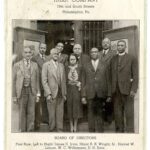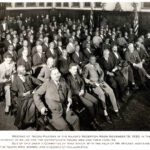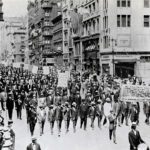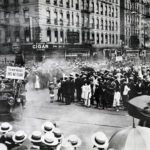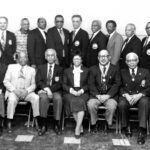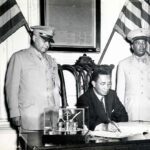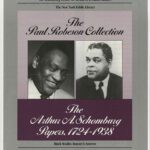
Warren G. Harding replaced Woodrow Wilson as President and wanted to “Return to Normalcy” after the First World War in 1921. Woodrow Wilson had ruthlessly inimical attitudes toward African Americans. He believed that giving African Americans the right to vote was “… the foundation of every evil in this country.”
During his first term in office, the House passed an act making miscegenation, or racial intermarriage, a felony in the District of Columbia. Wilson signed the bill. Congress controls the District of Columbia since it is a federal district, not a state. Until Wilson, Republicans controlled Congress and the Presidency and had no such law against miscegenation.
Wilson’s Postmaster General also ordered that his Washington offices be segregated. The Treasury and the Navy soon followed suit. Photographs were required of all applicants for federal jobs. When pressed by black leaders, Wilson replied, “The purpose of these measures was to reduce the friction. It is as far as possible from being a movement against the Negroes. I sincerely believe it to be in their interest.”
In 1913, Wilson reintroduced segregation to Washington DC and brought Jim Crow to the Federal workforce. He also dismissed Blacks from Federal jobs in the South and D.C. To an African American delegation in the White House, Wilson said:
“Segregation is not a humiliation. . . but a benefit and ought to be so regarded by you gentlemen.”
The Birth of the Nation was released in 1915. It was based on a 1905 novel called The Clansman. The Clansman was written by Thomas Dixon Jr., a classmate and friend of President Wilson. The movie’s box office success was uncertain until the historian President Woodrow Wilson viewed it at the White House. Wilson jumped to his feet during the film and shouted, “It is like writing history with lightning. And my only regret is that it is all so terribly true.” Wilson believed that the Ku Klux Klan had saved the South from an African American takeover during Reconstruction.
Newspapers reported that President Wilson loved the film, and the money started to roll in. The Ku Klux Klan had earlier been destroyed through Ulysses Grant’s Enforcement Act of 1871, also known as the Ku Klux Klan Act, Third Enforcement Act, Third Ku Klux Klan Act, Civil Rights Act of 1871, or Force Act of 1871. These Acts of the United States Congress brought martial law to the South and were intended to combat the Ku Klux Klan’s paramilitary vigilantism.
In reaction to Wilson’s support for the movie, William J. Simmons formed a new (the second) Ku Klux Klan in Georgia in 1915. The 2nd Klan was by far the largest. It had a significant presence in New Jersey and was especially strong in the Midwest and Northwest. The prime focus of hatred went towards the Catholic & Jewish immigrants and against any Catholics in America since the Klan believed Blacks had accepted their secondary status.
The Wilson Administration was very anti-African American. In contrast, Harding was an enemy of the Klan, pro-Civil Rights and Anti-Lynching. Democrats in Ohio accused Harding of being part West Indian “Negro.” Wilsonian Democrat Professor William Eastbrook, Chancellor, spread the rumor that Harding was part West Indian. Harding’s family tale reported that his great-great-grandfather, Amos, who pioneered and settled in Blooming Grove, Ohio, was “a West Indian Negro.” Chancellor said that in addition to Amos, Harding had a “Negress” great-grandmother, the wife of Amos Harding’s son.
Chancellor said Warren Harding’s candidacy was part of a plan to create a “Haitian-type” United States. The professor was as segregationist as any Southern Democrat.
He opposed allowing Blacks the right to vote.
When asked by a reporter whether he had Black ancestry, Harding never denied it! This is amazing for a 1920 politician. He said, “How do I know, Jim? One of my ancestors may have jumped the fence.” Modern DNA tests, however, show Warren Harding wasn’t America’s first Black president in 2015.
Nevertheless, he didn’t know it. His political opponents didn’t know it. Historians didn’t know it. Courageously, he still fought for civil rights, against the Klan, and lynching, even though Democrats were saying he was a descendant of West Indians! Although the House approved the anti-lynching bill in 1922, a phalanx of Democrats mounted a successful filibuster against it in the Senate.
Harding spoke in Birmingham, Alabama, and advocated civil rights for African Americans on October 26, 1921, just six months into his Presidency. He had hired African American federal workers in the South and chastised the Southern whites for not doing the same. While in Birmingham, Harding also voiced support for anti-lynching bills pending in Congress. Legislation seeking to curb the practice was initially sponsored in 1918 by Rep. Leonidas Dyer (R-Mo.). Senator Charles Curtis (R-Kan.) sponsored a companion measure in the Senate. They called for $10,000 fines to be levied against any county where a lynching occurred. The law demanded the prosecution of negligent state and county officials in federal courts and lodging federal murder charges against participants.
While in Birmingham, he also voiced three demands for equality. “The Negro must vote on the same terms that white folk vote.” “The Negro must be educated.” “The Negro must have economic justice.”
Nevertheless, he did not support “Social Equality.” Students can decide whether he did this to appease Southern whites. He claims to be following the science of the time and that Blacks did not want intermingling as much as whites did not support it. In the 1920s, it was uncommon for ethnic and religious groups to intermingle. Cultural de facto segregation could be seen in northern cities: Catholic/ Protestant/Jewish separation, along with separate WASP, Irish, Italian, etc., urban neighborhoods.
In a commentary on the speech, African American reformer W. E. B. Du Bois published “President Harding and Social Equality” in the official magazine of the National Association for the Advancement of Colored People, The Crisis, in December 1921. Du Bois wrote the article in reaction to the Birmingham, Alabama speech. President Harding’s oration was the first speech in the South by a sitting U.S. President since the Civil War. The occasion was the fiftieth anniversary of Birmingham as a city in the “New South.” President Harding’s speech, however, was controversial. Instead of discussing the designated topic of profitable mining in Birmingham, President Harding called for racial equality and argued that race was no longer only a regional concern. In his speech, President Harding argued that African Americans must receive the same voting, education, and economic rights as white Americans. As a Republican, this was a dangerous topic. No Republican Presidential candidate had ever won the state of Alabama, as most white Alabamans were solidly Democrats. African Americans generally voted Republican but were denied the right to vote by the white Democrats in the South.
New Jersey Student Learning Standards:
- 6.1.12.HistoryCC.8.c: Identify the conditions that gave rise to the Harlem Renaissance and assess the impact of artists, writers, and musicians on American culture.
- 6.1.12.Civics HR.8.a: Analyze primary and secondary sources to explain how social intolerance, and fear of anarchism led to restrictive immigration and refugee laws and the violation of the human rights of individuals and groups.
- 6.1 EconNM.8.a: Analyze the push-pull factors that led to the Great Migration.
Curriculum
- 3 Sections
- 3 Lessons
- Lifetime
- Stage 11
- Stage 21
- Stage 31
Lesson Materials:
| Name | Type |
|---|
